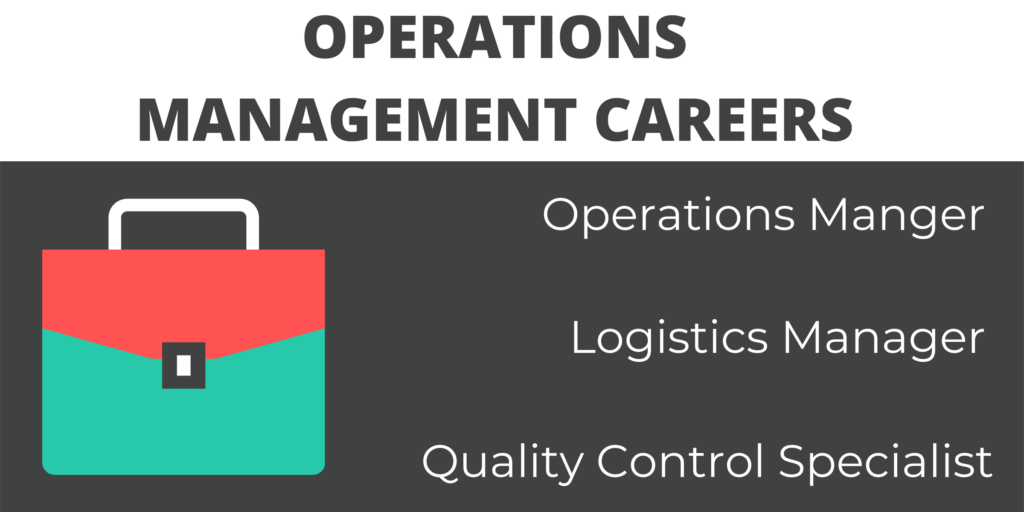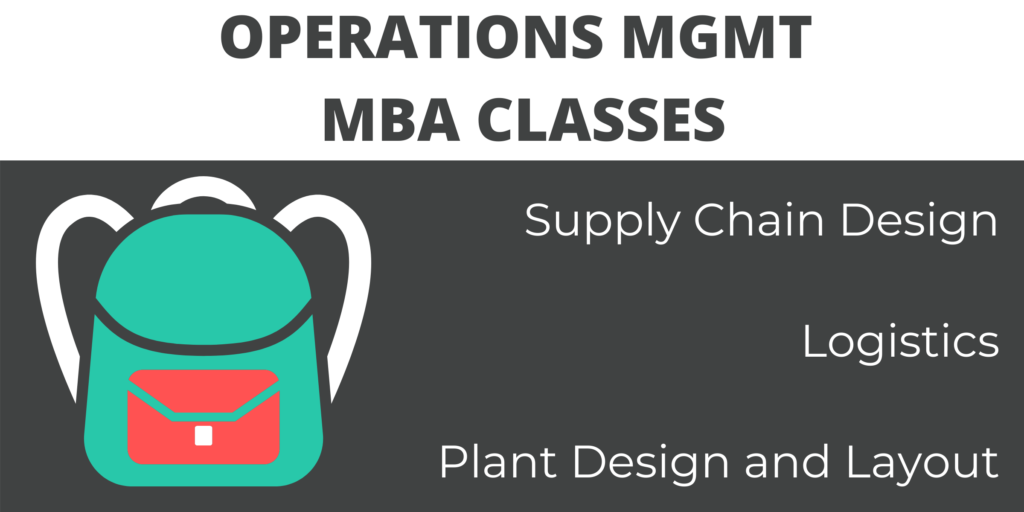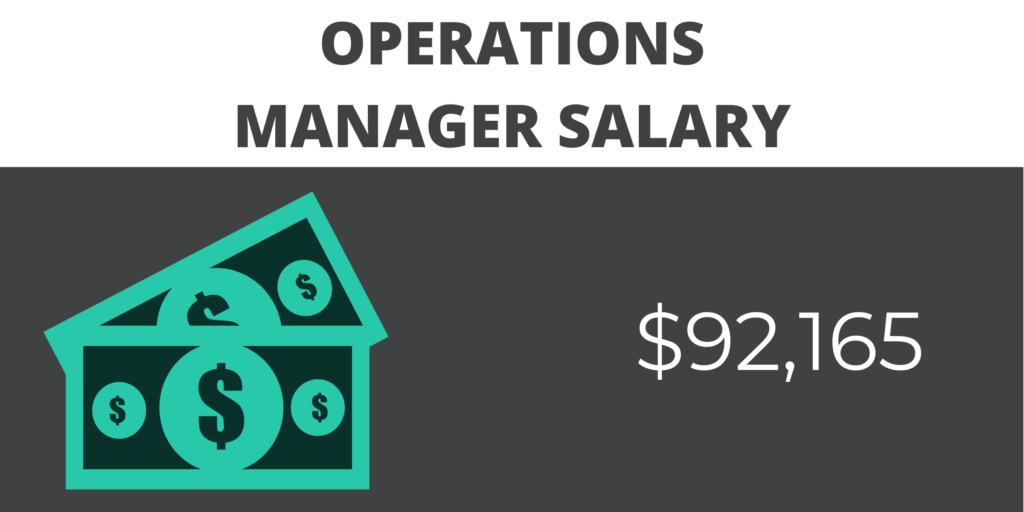In this guide we will explore the best entry-points into the operations management profession as well as the best career outcomes to work towards. A differentiating element of the operations management profession is that it is nearly identical to traditional business management or business administration in its general-form, and its distinction lies mainly in the direction of a particular specialization–such as supply chain management, logistics, or information technology (IT).
For this reason, many of the resources and guides that refer to MBAs will also apply inquiries related to operations management. With this in mind, we have compiled a catalogue of helpful links and resources below for a quick browsing of available content on the subject.
MBAs – General Questions or Concerns
- What Can I Do with an MBA?
- What is an MBA?
- Can I Get an MBA With Only a Liberal Arts Degree?
- Career Outlook For MBA’s
- Closing the Gap: The Rise of Women in MBA Programs
- How Quickly Can I Get an MBA?
- How to Choose a Quality MBA Program
- How To Choose An MBA Specialization
- International MBAs Vs Domestic MBAs
- Is an MBA Right for Someone Without a Business Degree?
- Should I Get an MBA Online?
- The Ultimate MBA Guide for Military Veterans
- What Career Can I Expect With an MBA?
Supply Chain Management
- What Can I Do with a Supply Chain Management Degree?
- What Can I Do with a Supply Chain Management Master’s Degree?
- 10 Best Master’s in Supply Chain Management Degree Programs
- 10 Best Online Supply Chain Management MBAs
- 10 Fastest Online Supply Chain Management Bachelor’s Degrees for 2020
- 10 Fastest Online Supply Chain Management Master’s Degrees for 2020
- 10 Most Affordable Online Supply Chain Management Bachelor’s Degrees for 2020
- 10 Most Affordable Online Supply Chain Management Master’s Degrees for 2020
- 15 Best Online Supply Chain Management Bachelor’s Degrees for 2020
- 15 Best Online Supply Chain Management Master’s Degrees for 2020
- 25 Best Supply Chain Management Bachelor’s Degrees for 2020
- 25 Best Supply Chain Management Master’s Degrees for 2020
Additional MBA Specializations
- What Can I Do with a Cyber and Information Security MBA?
- What Can I Do with a Healthcare Administration Master’s Degree?
- What Can I Do with a Master’s in Project Management?
- What Can I Do with a Master’s in Management?
- What Can I Do with a Sports Management Master’s Degree?
- What Can I Do With an International Business Management Degree?
- What can I Do with an IT Management Degree?
- What Can I Do with an MBA in International Business?
Additional MBA Program Rankings
Best MBA Programs
- The 10 Best Online Entrepreneurship MBA Degree Programs
- The 10 Best Online Finance MBA Degree Programs
- The 10 Best Online Human Resources MBA Degree Programs
- The 10 Best Online Marketing MBAs
- The Best Online Real Estate MBA Degree Programs
- 15 Best Online Cyber and Information Security MBA Degrees for 2021
- 15 Best Online MBA Degree Programs for 2020
- 15 Best Online MBA in International Business Degrees for 2021
- 25 Best Campus MBA Degree Programs for 2020
- 25 Best Cyber and Information Security MBA Degrees for 2021
- 25 Best MBA in International Business Programs for 2021
Best Associate’s, Bachelor’s, and Master’s
- 10 Best Online Associates in Business Administration
- 10 Best Online Bachelors in Management Degree Programs
- 15 Best Online Master’s in Accounting Degrees for 2020
- 10 Best Online Masters in Healthcare Management Degree Programs
- 20 Best Online Associates Degrees in Management
- 15 Best Online Healthcare Administration Master’s Programs for 2020
- 15 Best Online Master of Public Administration for 2020
- 15 Best Online Master’s in Entrepreneurship Degrees for 2021
- 15 Best Online Master’s in Project Management for 2020
Fastest and Most Affordable Programs
- 10 Fastest Online Cyber and Information Security MBA Degrees for 2021
- 10 Fastest Online International Business MBA Degrees for 2021
- 10 Fastest Online MBA Degree Programs for 2020
- 10 Most Affordable Cyber and Information Security MBA Degrees for 2021
- 10 Most Affordable International Business MBA Degrees for 2021
- 10 Most Affordable Online MBA Degree Programs for 2020
- 10 Most Affordable Sports Management Bachelor’s Degrees for 2020
- 10 Most Affordable Sports Management Master’s for 2020
- Accelerated MBA Programs
What is a Career in Operations Management?

Business professionals who excel in strategic thinking and business management may wish to specialize in operations management. Operations management is the sub-specialization within business administration wherein a manager develops expertise in running a specific type of organization or operation. These professionals then leverage their knowledge to drive optimization and profitability.
By developing a high level of speciality in a targeted industry of focus, operation management professionals offer a level of expertise that only the most experienced business managers can match. This means that operations managers are in the highest demand in industries with high barriers of entry that require insider knowledge of the market and current trends.
Supply chain management and logistics represents one of the most common career destinations for operations managers. Given the proper training, operations managers excel in this industry due to the high level of speciality needed to effectively manage and direct the successful running of supply routes around the world. Many operation managers choose to specialize in IT as well–but we will cover the available specializations in more detail shortly.
What is the Education for a Career in Operations Management?
As mentioned above, a career in operations management is dependent on the industry or operations model in which one chooses to specialize. The education for an operations manager in supply chain management will differ quite drastically from an operations manager who works in an information technology (IT) market.

With this in mind, developing the proper education for success in operations management is dependent on early and accurate specialization. While general operations management programs position students to excel in a number of different industries, the opportunity to develop mastery in key operations models within a targeted industry will be the superior option to many.
In other words, prospective students have two choices: to keep career options open by earning a general operations management degree, or to specialize in a key operation-type. Both paths have merits and trade-offs. Here is a basic overview of these considerations:
General Operations Management Programs

Pros
- Opens the door to employment in many industries and job markets
- Curriculums are universally applicable in business–mainly manufacturing and production
- Often allow students to develop custom speciality through electives and projects
Cons
- Graduates will not be as competitive within particular industry job markets
- General curriculums often do not have the time to allocate to special considerations
- General curriculums might not sufficiently prepare students to work in some industries
Specialized Operations Management Programs

Pros
- Opens more doors to employment within a targeted job market
- Curriculums are designed to prepare students to excel in a key job market
- Specialized programs often provide professional networks that lead to employment
Cons
- Graduates will not be as competitive in job markets outside of their speciality
- Specialized programs have little wiggle-room for exploration outside the program’s focus
- Programs have less time to allocate to the ‘universals’ of business
Operations Management and Supply Chain Management

The logistics and supply chain management industries have been some of the fastest growing job markets in the United States for years now. Because of this many operations management programs are angled towards a specialty in these markets even in general operations programs.
For this reason if you are sure that you do not want to work in the supply chain or logistics fields, then be sure to confirm that your curriculum will not waste valuable time and resources covering these topics. Many general Operations Management MBAs will offer some flexibility in coursework that will allow students to avoid this problem, but it bears mentioning nonetheless.
Conversely if you are someone who holds some interest in supply chain management or logistics but are unsure of your desired area of specialization, these programs offer the opportunity to build knowledge of the ‘universals’ of business operations while still building some speciality in logistics and supply chain management–the best of both worlds so to speak.
Additional Resources on Supply Chain Management
- What Can I Do with a Supply Chain Management Degree?
- What Can I Do with a Supply Chain Management Master’s Degree?
- 10 Best Master’s in Supply Chain Management Degree Programs
- 10 Best Online Supply Chain Management MBAs
- 10 Fastest Online Supply Chain Management Bachelor’s Degrees for 2020
- 10 Fastest Online Supply Chain Management Master’s Degrees for 2020
- 10 Most Affordable Online Supply Chain Management Bachelor’s Degrees for 2020
- 10 Most Affordable Online Supply Chain Management Master’s Degrees for 2020
- 15 Best Online Supply Chain Management Bachelor’s Degrees for 2020
- 15 Best Online Supply Chain Management Master’s Degrees for 2020
- 25 Best Supply Chain Management Bachelor’s Degrees for 2020
- 25 Best Supply Chain Management Master’s Degrees for 2020
The Difference between an MBA and an MBA in Operations Management

Much like the distinction between a specialized operations management program and a general operation management program, the difference here is also one of degree. Specifically, the difference between an MBA and an MBA in Operations Management is that the former prepares students to excel in any industry of business, while the latter provides students with the tools to excel in a particular industry of business.
The term ‘operations management’ refers to the notion that certain operations function differently and require different approaches to management. These different functionalities and approaches to management will be the main focus of an MBA in Operations Management.
These programs are still fundamentally MBA programs though, and students should expect to cover all the foundational studies that are central to a Master’s of Business Administration. In other words–in addition to studies of operations management, students will progress through the following traditional topics of an MBA:
- Accounting
- Budgeting
- Business Ethics
- Communications
- Economics
- Finance
- Leadership, Teamwork, Management
- Marketing
- Organizational Behavior
- Sales
- Statistics
Operations Management MBA Degree Programs
An Operations Management MBA will differentiate itself through a focus on considerations relating to particular operations and business functionalities. That is, the curriculum is designed to develop in students an array of skills and leadership abilities that will drive success in any organization, business model, or operational format.
As mentioned above though, specialized Operations Management MBA programs will narrow the scope of this focus to a particular industry, focusing more comprehensively on subjects relating to production and manufacturing. But for the most part, students can expect to engage coursework that delves into the following topics and considerations:
- Data analytics
- Data modeling
- Logistics
- Manufacturing processes
- Manufacturing strategy
- Organization structures and hierarchy
- Organizational leadership
- Operations management
- Operations strategy
- Performance Analysis
- Plant design and layout
- Product design and development
- Supply chain design
- Supply chain management
- Workforce management
Operations Management MBA Specializations
As mentioned in the introductions, an Operations Management MBA is a specialized degree to begin with but that does not mean that additional options for specialization are not available. In fact, any MBA specialization could be helpful depending on one’s desired profession.

To give some examples–students interested in working within the tech operations industry would be well-served to establish some specialization in software, data management, or computer science. Likewise students interested in working in logistics would find tremendous value in learning data science. So while the most valuable choice will depend almost entirely on a particular students’ desired career outcomes, here is a list of the most common MBA specialization options available:
- Accounting
- Business Analytics
- Business Economics
- Environment & Energy
- Entrepreneurship & Innovation
- Finance
- Healthcare Management
- Insurance & Risk Management
- International Business
- Management
- Marketing
- Multinational Management
- Organizational Effectiveness
- Public Policy
- Quantitative Finance
- Real Estate
- Statistics
- Strategic Management
- Sustainability
As astute readers will have noticed, the available MBA specializations options mirror MBA curriculum topics. In other words, students have the opportunity to earn a degree specialization in any of the subjects covered in an MBA. Not all programs will offer one’s desired specialization track, if any specialization for that matter, however the point is that some programs will offer them and these programs bear seeking out if the specialization matches one’s intent.
Additional Resources on MBA Specializations
- What Can I Do with a Cyber and Information Security MBA?
- What Can I Do with a Healthcare Administration Master’s Degree?
- What Can I Do with a Master’s in Project Management?
- What Can I Do with a Master’s in Management?
- What Can I Do with a Sports Management Master’s Degree?
- What Can I Do With an International Business Management Degree?
- What can I Do with an IT Management Degree?
- What Can I Do with an MBA in International Business?
The Operations Management Industry in 2021 and Beyond
General and operations managers can earn some serious cheddar and their job market is growing at a rate significantly higher than the national average. This is an important consideration given the price tag and investment of time associated with MBA programs.
Many students will need to take on student loans in order to enroll in a quality MBA program, and so it is understandably encouraging when a job market offers strong metrics of success. With this in mind, consider the industry profile as reported by the Bureau of Labor Statistics:
Industry Profile for General and Operations Managers
General Profile
- 2,212,200 jobs as of 2019
- Average annual salary of $123,460
- Equates to hourly wage of $59.35
- Estimated job growth of 6% from 2019 to 2029
Salary Ranges
- Bottom 10% ——————- Median of $44,510 ($21.40 per hour)
- Bottom 25% ——————- Median of $65,590 ($31.53 per hour)
- 50th percentile —————- $100,410 ($48.27 per hour)
- Top 75% ———————— Median of $156,580 ($75.28 per hour)
- Top 90% ———————— Median of $208,000 ($100 per hour)
Largest Industries for Employment of Operations Managers
- Management of Companies and Enterprises
- Employment: 88,460 people
- Average Annual Salary: $162,510
- Restaurants and Other Eating Places
- Employment: 70,770 people
- Average Annual Salary: $77,970
- Management, Scientific, and Technical Consulting Services
- Employment: 65,640 people
- Average Annual Salary: $157,460
- Computer Systems Design and Related Services
- Employment: 58,940 people
- Average Annual Salary: $163,860
- Local Government, excluding schools and hospitals
- Employment 56,810 people
- Average Annual Salary: $102,180
As one might expect, the management of companies and enterprises makes up the largest sector of professional opportunity for graduates of an Operations Management MBA. This is an excellent indication that a general operations management MBA is highly valuable, that is, because it prepares students to take on management positions within any industry or business model–therefore positioning students to capitalize on this abundance of opportunity.
Highest Paying Industries
- Monetary Authorities-Central Bank
- Employment: 670 people
- Average Annual Salary: $210,640
- Securities, Commodity Contracts, and Other Financial Investments
- Employment: 22,480
- Average Annual Salary: $194,990
- Scientific Research and Development Services
- Employment: 15,990 people
- Average Annual Salary: $182,900
- Oil and Gas Extraction
- Employment: 4,470 people
- Average Annual Salary: $178,960
- Insurance and Employee Benefit Funds
- Employee: 160 people
- Average Annual Salary: $171,920
Let’s lay out some takeaways from the above numbers. While the banking industry appears to be the most financially lucrative area in the operations management job market, it is also the most extreme in terms of competition. While the average salary range is astronomical, these salaries are competed for by a staggering low number of professionals–670 people to be exact.
So with this in mind, if you have your sights set on the banking industry, it will behoove you to build as much expertise in the banking industry as possible. Only the most decorated and successful managers will beat out the competition for this small but lucrative group of jobs.
The other majorly notable point here is that the ‘Securities, Commodity Contracts, and Other Financial Investments’ industry offers both sky-high salaries as well as a sizable job market. While the job market is roughly a quarter of the size of the largest industry for operations managers (company and enterprise management), the average salary is about nearly 20% higher.
So for ambitious students who are confident that they can beat out competition but who also want a healthy job market, the ‘Securities, Commodity Contracts, and Other Financial Investments’ industry is a tremendously promising option.
Securities, Commodity Contracts, and Financial Investments
According to the Bureau of Labor Statistics, this promising industry is made up of several industry groups relating to stock and commodity exchanges, as well as other trading activities:
- Securities and Commodity Contracts Intermediation and Brokerage
- Securities and Commodity Exchanges
- Other Financial Investment Activities
Specifically, operations managers interested in breaking into this industry will want to establish expertise in the finance sector. This might include earning an additional MBA specialization in finance, quantitative finance, accounting, or finance strategy. Additionally, students interested in this line of work will want to take advantage of internship and research opportunities that groom students for work in the trade market.
Promising Locations for Operations Managers in the United States
In many cases, location is nearly–and in some cases more–important than one’s education. By positioning oneself in a job market with abundant opportunities, competition will be less impactful and salary packages will be more lucrative.
As one might expect the opportunities for operations managers are largely coastal in terms of geographic positioning in the United States. Given that the bulk of the profession is concerned with supply chains and manufacturing, states with strong international connections and supply lines seem to be the most promising with the most sizable job markets:
- California
- Number of jobs – 255,210
- Average annual income – $136,080
- Texas
- Number of jobs – 165,360
- Average annual income – $135,510
- New York
- Number of jobs – 160,760
- Average annual income – $151,920
- Illinois
- Number of jobs – 118,820
- Average annual income – $124,190
- Florida
- Number of jobs – 97,630
- Average annual income – $117,820
One thing to note here is that while salaries might appear to be much higher in metropolis centers, the cost of living is also much higher. So when navigating this data, one should consider this trade-off. Consider the graphic below for specific information:
<<DO NOT INCLUDE>> (here is link to excel sheet with raw data for employment data by state for operational managers: https://docs.google.com/spreadsheets/d/1FNlcftjdkWk7ILck9p4MVyf59e3xL9RktFU57RyFhac/edit?usp=sharing)
Carrie Morris
Author
Warren Dahl
Editor-in-Chief
